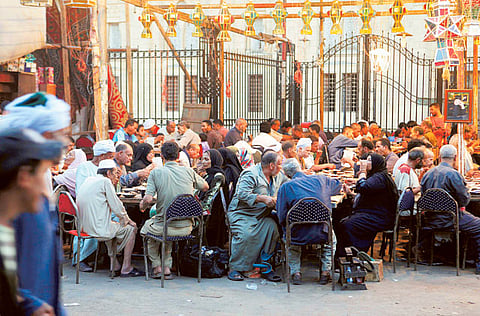Unique dates sweeten Egypt’s turbulent politics
Mursi and Shafiq dates vie for customers at local dried dates market

Cairo: Standing inside his shop encroaching on the street pavement, Ali Hussain enthusiastically promotes his seasonal goods. “Mention God and end your fast [iftar] with the Mursi dates,” shouts Hussain in a melodious voice, touting a premium brand of dried dates named after Egyptian President Muhammad Mursi. Egypt’s merchants of dried dates have long developed the tradition of naming their goodies during Ramadan after celebrities. In the years before the January 2011 revolt that toppled Hosni Mubarak, the fine grades of dried dates carried the names of famed entertainers and footballers. Last year, the anti-Mubarak uprising bucked the trend, with the top grades called “Tahrir”, the focal point of the mass protests against the former strongman, “martyrs” referring to the people killed in the revolt, and “the army”, who took over after Mubarak.
“Politics continue to dominate the dates market,” says Hussain, the merchant in the working-class Cairo area of Al Sayyeda Zeinab. “With Mursi now the president, the dates carrying his name, sell for 14 Egyptian pounds [Dh10] a kilo. This type is particularly popular with Islamists,” he adds. “Other kinds, called the revolution, Tahrir and the army are still in high demand.”
During Ramadan, Muslims end their fast with dates, which are either dried or soaked in water following the example of the Prophet Mohammad (PBUH). The fruit nourishes the body and makes up for the energy lost during the long hours of fasting, nutrionists say.
According to Khedr Abdul Fatah, another trader in dried dates in northern Cairo, the top brand is named after Ahmad Shafiq, a former military general who was also a presidential potential in the run-off in mid-June. “The majority of residents of the area were supporters of Shafiq. So, I thought it is better to name the best kind of dried dates after Shafiq,” says Abdul Fatah. “The Shafiq dates sell for 14 pounds per kilo, followed by another grade carrying the name of Al Musheer (Field Marshal) that sells for 13 pounds per kilo,” he adds, referring to Field Marshal Hussain Tantawi, the head of the Supreme Council of Armed Forces.
“The cheapest type is called Al Felul, which I sell for only five pounds a kilo,” says Abdul Fatah, using a derogatory term harking back to the Mubarak regime. “Smart dealers in dried dates should be aware of what is going in Egypt and even the region to use fancy names for their wares that will attract customers,” he adds.
Local merchants say this year’s business is better than the past Ramadan’s. “Although political and economic trouble is still there, the country is moving towards stability,” says Abdul Fatah. “The Egyptians want to fully enjoy Ramadan during which time eating dried dates is a key tradition.”



